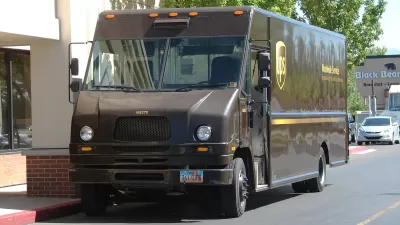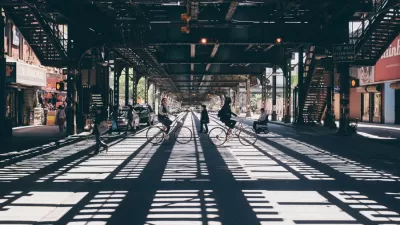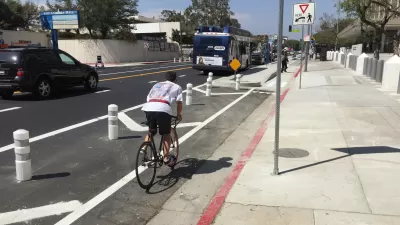The program deployed electric cargo bikes in a small Seattle neighborhood to test the effectiveness of replacing delivery trucks with lighter vehicles in the last mile of delivery.

A pilot program that used electric cargo bikes to make deliveries in a Seattle neighborhood reduced emissions for each package by 30 percent, reports Kristin Toussaint. The bikes were meant to replace delivery trucks that "cause congestion and spew carbon emissions as they drop off more and more packages" in the last mile of delivery. "The Seattle pilot—a partnership between the city, Coaster Cycles, logistics company AxleHire, and others, coordinated by the University of Washington’s Urban Freight Lab—tested last-mile alternatives like e-cargo bikes and delivery lockers, in hopes of finding solutions that reduced emissions and eased traffic."
Although it might seem like zero-emission delivery vehicles should reduce emissions by more than 30 percent, "researchers counted emissions from the truck bringing goods to the micro-hub, explains Anne Goodchild, founding director of the UW Supply Chain Transportation and Logistics Center, which launched the Urban Freight Lab."
"Along with reducing emissions, using e-bikes and the microhub halved the number of miles traveled per package compared to traditional truck routes, which helped to reduce congestion." While the pilot program had its limitations and may not show the same results at scale, improved bike lanes and parking infrastructure could help. "Testing these ideas before they can be called solutions is a crucial step in designing better last-mile delivery, and Goodchild hopes her lab’s research helps inspire additional delivery pilots."
FULL STORY: This e-bike delivery experiment reduced CO2 emissions by 30% per package

Maui's Vacation Rental Debate Turns Ugly
Verbal attacks, misinformation campaigns and fistfights plague a high-stakes debate to convert thousands of vacation rentals into long-term housing.

Planetizen Federal Action Tracker
A weekly monitor of how Trump’s orders and actions are impacting planners and planning in America.

In Urban Planning, AI Prompting Could be the New Design Thinking
Creativity has long been key to great urban design. What if we see AI as our new creative partner?

Portland Raises Parking Fees to Pay for Street Maintenance
The city is struggling to bridge a massive budget gap at the Bureau of Transportation, which largely depleted its reserves during the Civd-19 pandemic.

Spokane Mayor Introduces Housing Reforms Package
Mayor Lisa Brown’s proposals include deferring or waiving some development fees to encourage more affordable housing development.

Houston Mayor Kills Another Bike Lane
The mayor rejected a proposed bike lane in the Montrose district in keeping with his pledge to maintain car lanes.
Urban Design for Planners 1: Software Tools
This six-course series explores essential urban design concepts using open source software and equips planners with the tools they need to participate fully in the urban design process.
Planning for Universal Design
Learn the tools for implementing Universal Design in planning regulations.
Gallatin County Department of Planning & Community Development
Heyer Gruel & Associates PA
JM Goldson LLC
City of Camden Redevelopment Agency
City of Astoria
Transportation Research & Education Center (TREC) at Portland State University
Jefferson Parish Government
Camden Redevelopment Agency
City of Claremont





























